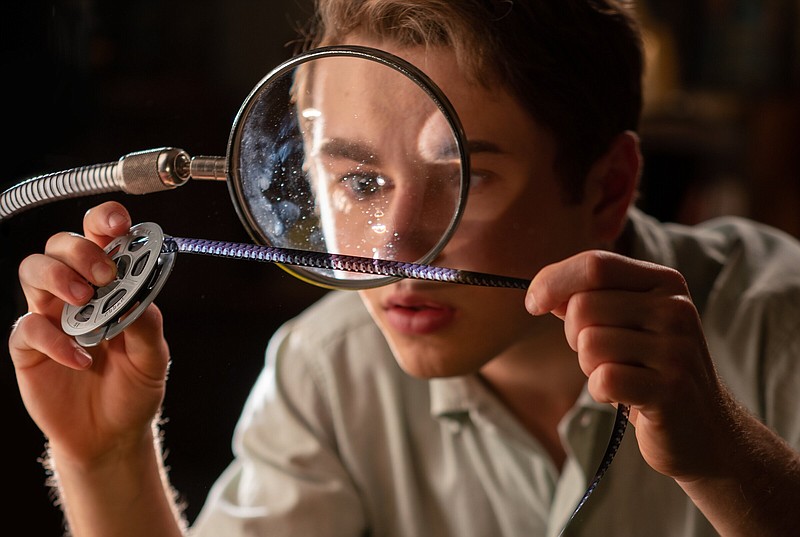"The Fabelmans" raises a question: "What's the point of making an autobiographical film about your troubled childhood if you aren't the least bit interested in investigating the honest emotional truth behind it?"
Steven Spielberg's film, which premiered at the Toronto International Film Festival in September to a mostly adoring critical throng, covers the basics of his growing up, with most of the already accepted canon about him: At an early age, the young director-to-be became besotted with movies after his parents took him to "The Greatest Story Ever Told." His father (in the film played by Paul Dano), a brilliant engineer and a pioneer of computer design, moved the family around a bit, spending time in New Jersey and Phoenix, before settling in California; his mother (Michelle Williams), a flamboyant musician, was in love with her husband's best friend (Seth Rogen), and eventually, his parents split up to accommodate her wishes.
But all the while, the young Spielberg, called Sammy in the movie (and played as an older teenager by Gabriel LaBelle) is making movies, dreaming of the day he can get behind a camera in Hollywood. The makings of an interesting self-investigation from one of the country's most celebrated filmmakers is certainly there, and at this point, Spielberg has a more or less blank check from the studios to make whatever he wants, which is why this hammy, overly blithe project feels like such a misfire. As penned by Spielberg and frequent collaborator Tony Kushner, the story is reduced to so much shtick, a slick, surfacey retelling of the myth, as if crafting a superhero origin story of his own.
In one extended section, after the family has moved to California, in time for Sammy to start high school, he runs afoul of some jocks, for, among other things, their ugly anti-semitism, but the film spins it as a test for the hero to rise to the challenge, using the power of his camera to teach them all a valuable lesson, etc. etc. It might very well be factually true (though, let us say, I sincerely doubt it), but it still plays like a wish-fulfillment fantasy. Who among us wouldn't like the chance to put our high school tormentors in their place? But that's not a good enough reason by itself to devote a large section of a film to showing their comeuppance.
The whole enterprise has that similar smug remove, recasting what might have been truly devastating and unsettling into a series of antics, as if the most financially successful director in cinematic history somehow needs even more reassurance from everyone that he's just fine, and his upbringing was perfectly OK.
There are good moments sprinkled throughout, and Dano, for his part, carries the role with solemn dignity and understatement (in direct contrast to the mawkish Williams, whose big presentation and overemoting feel from a different movie altogether). You can feel Spielberg struggle to make sure everyone is treated fairly -- the film takes great pains not to pin the blame of the break-up on anyone, and tries to show how everyone was actually OK after it happened -- but, then, if the divorce was so even-handed and well-received, why bother making a film about it in the first place?
Instead, it's played as a glazed-over "Portrait of the Artist" piece -- easily, the most convincing and successful elements involve Sammy's early forays into big spectacle filmmaking with his classmates, including one scene where he's making a war picture that hints at his extraordinary ability to choreograph intricate action scenes for maximum impact.
One gets the sense Spielberg was much more comfortable exploring those elements of his growing up than anything more emotionally taxing, requiring an adult perspective. There is a final scene involving the young director, now in his early 20s and trying to find any sort of toehold in Hollywood, getting to meet a legendary figure, which we are to understand was the beginning of what became his professional life's work. It's amusing, a great anecdote, but the fact that Spielberg and Kushner choose to close out the film on that sort of note only adds to the feeling of glibness, like listening to someone pontificate about their life and times as the keynote speech at a banquet in their honor.
It's no doubt revealing (however unintended) to watch one of the great visual storytellers of our time use his otherworldly abilities not to illuminate the depths of his soul, but instead to cover it up with gauzy wrapping paper and colorful, blinking lights. As kids, we all have fantasies of how those things in our lives that cause us misery -- difficult family situations, racism, having to move and start over again and again -- might be resolved. The difference here is Spielberg is given financial carte blanche and a bully pulpit to exhibit his.
Releasing in the midst of awards season, and doubtless a frontrunner for a Best Picture nomination, Spielberg has actually gone and created a film that seems perfectly emblematic of the problem with these pre-manufactured sorts of awards-coaxing fare: By playing it nothing but safe, and shutting down any expression of grief, longing, or disappointment, he proves the film is little better than a pantomime, a magic show to fool the rubes into thinking they have any better inkling of his inner workings than they did before they saw it.
‘The Fabelmans’
79 Cast: Michelle Williams, Paul Dano, Seth Rogen, Gabriel LaBelle, Judd Hirsch, Jeannie Berlin, David Lynch, Julia Butters
Director: Steven Spielberg
Rated: PG-13
Running time: 2 hours, 31 minutes
Playing theatrically
